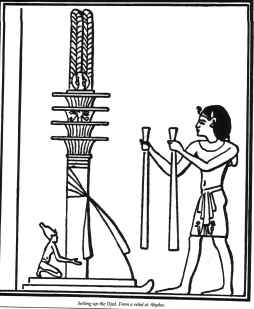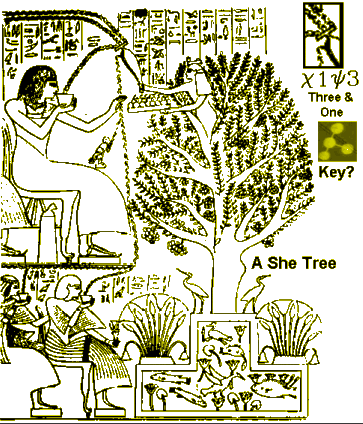The Osiris Legend and the Tree of Life (the Axis Munde)

The earliest reference to the concept of the Tree of Life is to be found in the philosophy of the Ancient Egyptians. In the Osiris Legend, Osiris was induced by his wicked brother Set to lie down in a magnificent coffer under the pretext of a game at a banquet. Set and his seventy-two conspirators immediately closed the lid and threw the coffer into the Nile
.Osiris' wife Isis, who was also his sister, searched for and found the chest which had been borne down the Nile and across the sea to what was later identified as the Phoenician coast, where it was deposited at the foot of a tamarisk tree. As the tree grew it enclosed Osiris and the chest within its trunk ... which was later cut down by the king of Byblos and used as a pillar in his palace. The fragrance of the pillar became renowned far and wide, and when Isis heard about it she immediately understood its significance. Isis returned the pillar, and the body it contained, to Egypt.
In "Ancient Egyptians and the Constellations: Part 2" the Lost Secret of the process of the Creation of the Universe was disclosed … the Celestial Sphinx Hu / Osiris, symbolizing the Masculine Creation Principle, breathed Life into the constellations.
The loss of this Secret inspired another explanation of the Creation of the Universe. There was a primordial ocean called Nun. It wasn't flat; rather it was in the shape of a cosmic egg … and from this cosmic egg was born the primeval hill called Nu.
Both the egg and the primeval hill are recorded on pictures of Isis in the tombs of the Ancient Egyptian Pharaohs; indicating that Isis was the personification of the Feminine Creation Principle. She was the Holy Mother who was represented with her child Horus by the Constellation of Virgo. Isis was considered Virgin as she was seeded after the death and resurrection of Osiris … minus the phallus.

In ancient Egyptian texts it is written of the Tree of Life, "I am the plant which comes from Nu." The Tree of Life grew out of the Sacred Mound, it's branches reaching out and supporting the stars and planet studded sky, while it's roots reached down into the watery abyss of the Netherworld. The trunk of the Tree of Life represented the World Pillar or Axis Munde (literally "Axis of the Mound") around which the heavens appeared to revolve. The World Pillar was the centre of the universe.
The Ancient Egyptian symbol for "plant" meaning "Tree of Life" was three sacred lotus lilies. They have tree stems curving to the left as though blown into Life by the breath of Hu, the Celestial Sphinx. On top of each stem is the Lotus flower which was used in Ancient Egypt to represent Life and Resurrection. It is from this hieroglyph that the "fleur de lis" which is frequently found in Ancient Egyptian Art traces its origin. The "fleur de lis" represents the Tree of Life. The glyph which denotes the sacred knowledge associated with Hu is also formed by the three stems of the three sacred lotus lilies. The Osiris Crown can be similarly considered in these terms. Following the role model of Osiris, in 1346AD Edward the Black Prince won three feathers at Crecy which he adopted as his emblem. If the three feathers are gathered at the stems a fleur de lis is created.
Osiris, in his earliest Axis Munde form of a Tamarisk tree trunk, was called Djed. His later mummy wrappings were symbolic of his having been encased inside a tree trunk. His mummy was therefore an Axis Munde (cosmic axis, world axis, world pillar, columna cerului, center of the world)...as indeed were all future mummies. Over time the tree trunk was replaced by the imagery of a pillar which became known as the Djed pillar of Stability.
When Osiris was enclosed in the trunk of a Tamarisk tree, which was later cut down and used as a pillar in the Palace of the King of Byblos, he metaphorically became one with the Tree of Life. Osiris became the Axis Munde around which the heavens appear to revolve; he became the World Pillar, the link between the terrestrail and celestial worlds. He held the heavens in his outstretched arms, and he soaked up the Word of God from the waters of the Netherworld. In Ancient Egypt the Netherworld was called the " Netterworld" meaning the "World of the gods" The Gods had their own home among the stars.
When the city of Memphis " The White Wall" was founded, the god Ptah replaced the mummified Osiris as the Djed Pillar. Accroding to the Shabaka Stone, the founders of Memphis subordinated and assimilated all the aspects of the Osiris Cosmogony on favour of Ptah and the Memphite Cosmogony (the origin and evolution of the universe).